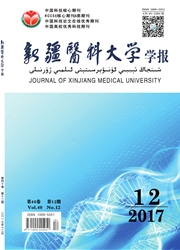

 中文摘要:
中文摘要:
Objective To determine the effects of genetic variation in the organic cation transporter 1(OCT1)on the short-term responses of the antidiabetic drug,metformin.Method A total of 22 patients recruited with type 2 diabetes or IFG were treated with metformin(2 000 mg/day)for 1 week.The patients were screened from Second Jikun hospital and Kashidonglu community medicine service,Urumqi,China and their surrounding districts.To examine the effects of metformin on plasma glucose,total cholesterol,low-density lipoprotein-cholesterol,high-density lipoprotein-cholesterol and triglyceride in relation with R61C,G465R and 420 del variants of OCT1(gene encoding organic cation transporter 1,mainly locating in liver,which is metformin's major target)in subjects.In all,R61C,G465R and 420del of OCT1 gene were examined using DNA extracted from whole blood and PCR-RFLP.Data concerning with gene and metformin treatment were handled by t-test.Result After metformin treatment,there were increases both in FPG and LDL(P=0.011and P=0.013 respectively).To divide all participants into mutant and wild groups,according to the polymorphisms of R61C,G465R and 420 del respectively,as well as carriers with one of the mutant genotypes at least and carriers with none of the mutant sites.Analysis was made to compared FPG,Chol,TG,and LDL and HDL between carriers of wild genotypes and carriers of other genotypes showed no statistic significance both before the metformin treatment and after the treatment.The same is the case with changes of FPG,Chol,TG,and LDL and HDL of wild genotype carriers and variant genotype carriers,except of LDL changes(P=0.05)in patients grouped by G465R polymorphisms and TG changes(P=0.03)in subjects differed by 420del genotypes.Conclusion In this study,it is suggested that OCT1 gene polymorphisms have little contribution to the clinical efficacy of blood glucose control by metformin among Uygur people with type 2 diabetes or IFG,but it may have possible relationship with the clinical efficacy on fat
 英文摘要:
英文摘要:
Objective To determine the effects of genetic variation in the organic cation transporter 1(OCT1)on the short-term responses of the antidiabetic drug,metformin.Method A total of 22 patients recruited with type 2 diabetes or IFG were treated with metformin(2 000 mg/day)for 1 week.The patients were screened from Second Jikun hospital and Kashidonglu community medicine service,Urumqi,China and their surrounding districts.To examine the effects of metformin on plasma glucose,total cholesterol,low-density lipoprotein-cholesterol,high-density lipoprotein-cholesterol and triglyceride in relation with R61C,G465R and 420 del variants of OCT1(gene encoding organic cation transporter 1,mainly locating in liver,which is metformin's major target)in subjects.In all,R61C,G465R and 420del of OCT1 gene were examined using DNA extracted from whole blood and PCR-RFLP.Data concerning with gene and metformin treatment were handled by t-test.Result After metformin treatment,there were increases both in FPG and LDL(P=0.011and P=0.013 respectively).To divide all participants into mutant and wild groups,according to the polymorphisms of R61C,G465R and 420 del respectively,as well as carriers with one of the mutant genotypes at least and carriers with none of the mutant sites.Analysis was made to compared FPG,Chol,TG,and LDL and HDL between carriers of wild genotypes and carriers of other genotypes showed no statistic significance both before the metformin treatment and after the treatment.The same is the case with changes of FPG,Chol,TG,and LDL and HDL of wild genotype carriers and variant genotype carriers,except of LDL changes(P=0.05)in patients grouped by G465R polymorphisms and TG changes(P=0.03)in subjects differed by 420del genotypes.Conclusion In this study,it is suggested that OCT1 gene polymorphisms have little contribution to the clinical efficacy of blood glucose control by metformin among Uygur people with type 2 diabetes or IFG,but it may have possible relationship with the clinical efficacy on fat
 同期刊论文项目
同期刊论文项目
 同项目期刊论文
同项目期刊论文
 期刊信息
期刊信息
